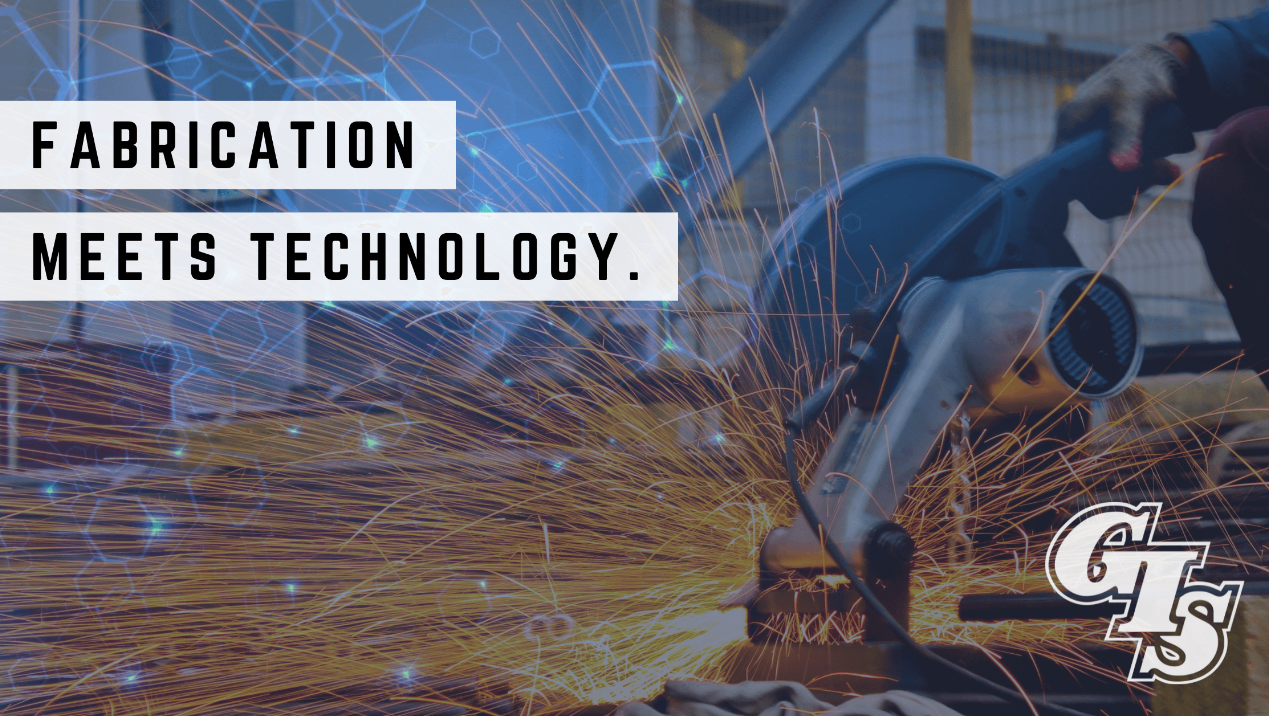“The more you build, the more you’re going to learn.” Lee Anthony Bordelon Sr ought to know, he’s been with GIS for twenty-seven years, now as Vice President Fabrication.
And the man has overseen a lot of building during his tenure. GIS now owns and operates four fabrication yards, three on Louisiana’s Gulf Coast (Lafitte, Galliano, and Abbeville) and one further inland (Franklinton).
ON THE FOREFRONT OF RECYCLING AND REUSE
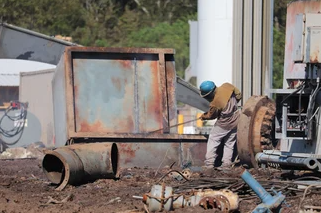
Serving the offshore oil industry as their primary business, GIS fabricates components for construction as well as commercial fishing and agriculture. GIS subsidiary, Mack Steel, is located at the GIS headquarters in Galliano.
In addition to the four fab yards, Lee oversees two in-state scrapyards (Abbeville and Fourchon) that promote sustainable recycling and reuse operations wherein leftover materials from the fabrication jobs are remelted and reformed to serve future projects.
Considered to be the most recyclable material, steel can be remelted-and-reused ad infinitum, without loss to its properties. New steel products typically contain upwards of forty percent recycled steel. GIS capitalizes on the properties of steel to the extent that operations require multiple barges loaded each with 1,000+ tons of scrap per month to transport for melting into new steel.
Conserving natural resources is an ethos fundamental to GIS’s fabrication operations. That is: one ton of recycled steel saves 1,400 kg of iron ore, 740 kg of coal and 120 kg of limestone. It also equates to energy savings as well as job creation, all of which helps the bottom line with savings and ethical production passed onto the customer.
EMBRACING DIGITAL TECHNOLOGY
GIS pursues maximum efficiency for all projects, though it is particularly important for the projects of larger scale. Digital technology enables this effort.
Digital partnerships with materials management software allows for seamless inventory oversight that integrates with work packs, ensuring material readiness. Larger builds, for example, could require five-million components. Through digital solutions, the user would barcode the pieces, enabling each individual piece to be tracked through the completion of the project phase. Productivity reporting features give managers omnipotent and remote oversight with a few strokes on a tablet.
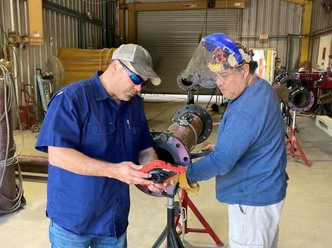
Lee prides over his team’s impressive execution of a particularly complex project in GIS’s fab yard at Abbeville.
A stunningly complicated shutdown valve – which is effectively an oil-field equivalent to a drilling blowout preventer (BOP) – this behemoth will terminate in-and-out flows of an entire platform at the touch of a button without delay. Not one piece on this job had the same angle – it is difficult to overstate what a challenging task this posed. But the GIS fabrication team, with the help of mobile technology, make it look easy.
The GIS fabrication yards sidestep the cost of doing business out at sea. And, despite the complexity of such a project, GIS managed around ninety-eight percent of the process in house, which offers further savings. This amount of in-house control is afforded by GIS’s progressive embrace of digital technology.
PRIDE IN QUALITY AND EFFICIENCY
The GIS fabrication teams have the capabilities to do it all, including engineering design, fabrication and construction, and electrical and instrumentation. GIS is able to offer such extensive services owing to their adoption of digital technology, which streamlines the ways teams communicate and reinforces a no-excuses quality assurance standard.
While GIS’s use of industrial software is a high-tech solution, it falls plainly in line with their values of quality and efficiency.
Materials management solutions enable sound and thorough quality assurance throughout the fabrication process. And materials management systems can be integrated with more holistic digital solutions that further streamline processes.
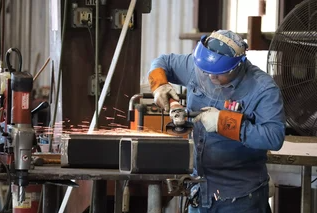
There is little room for error in fabrication – each and every component must be precise and must have integrity to withstand extremities of industrial uses. Welding, for example, is subject to extensive quality checks including x-ray, as well as hydro and pressure tests. This would be the expectation of any institutionalized fabrication operation.
Non-negotiable quality assurance in parallel with a materials-lifecycle mentality that minimizes waste through reuse and recycling, plus a technological solution to materials management makes for a cutting-edge service.
WHERE A HANDSHAKE STILL MEANS SOMETHING
Combining old fashioned values with the use of new technology is where GIS shines. Lee embodies GIS’s core values, a powerful mix of old and new. The fab yards are a place where, as he says, “a handshake still means something.” He is equally proud of their successful adoption of progressive technology.
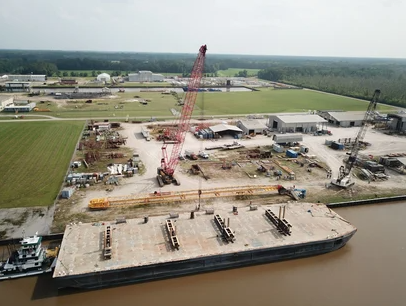
When it comes to technology, Lee admits that GIS had a learning curve to leap through in the beginning. But, then again, they’ve been around a long time, since 1948, starting from the bottom and working the way up. They’ve seen it all, but it’s their visionary adoption of mobile technology that saves resources, money and time to great effect.
Digital solutions also foster a safe environment that reduces room for human error as well as reinforcing GIS’s people-first culture that actively promotes professional development and advancement. These tools additionally enhance worker performance. And when workers are performing at their highest levels, they display positive attitudes, along with being more efficient and more eager to learn and grow.
When the bar is set high thanks to technological advancement, emphasizing quality principles, that Southern smile, and a handshake, really do mean something.

